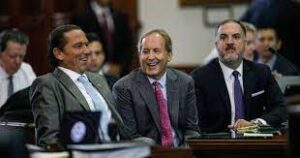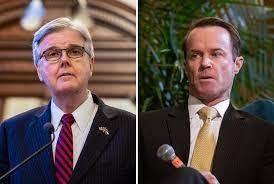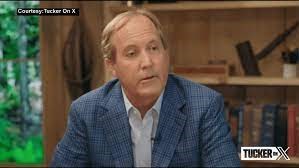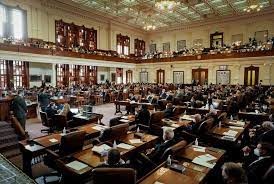
Here’s a quick recap of what happened over the last week:
Paxton Acquittal

We have all heard by now that Attorney General Ken Paxton was acquitted by members of the state Senate on all articles of impeachment that accused him of taking bribes and abusing the power of his office to help a local campaign donor. The historic vote took place Saturday afternoon after a two-week trial in the Senate and after the Texas House had voted overwhelmingly to recommend impeachment back in May. Paxton – who had been suspended since May pending the outcome of the trial – returned to work in the AG’s office on Monday morning.
Paxton – who was absent for most of the trial – issued a statement in part saying “the truth could not be buried by mudslinging politicians or their powerful benefactors.” Paxton still faces other legal troubles. His trial for an 8-year-old felony securities fraud indictment is now set to begin in Houston in February. That case accuses Paxton of working on behalf of a company to secure investors without disclosing he was being paid to do so. But Paxton’s most serious legal issue involves and ongoing FBI investigation into his connection to the above-mentioned campaign donor, Nate Paul. This relationship was the subject of the impeachment trial. Several news outlets have reported that federal prosecutors have seated a grand jury to consider evidence in this case. One of the witnesses in the impeachment trial confirmed she had provided testimony to a grand jury on this particular matter.
The trial became the subject of intense political conversation and scrutiny, with Paxton supporters becoming increasing vocal in their opposition to removing the Attorney General from office due to his record of defending conservative policies and track record of constantly suing the Biden administration over their policies regarding immigration, border enforcement, abortion, gun safety, and numerous others. In the end, only 2 of the 19 Republican members of the Senate voted against Paxton, falling well short of the 21 needed for conviction.
After the vote, Lt. Governor Dan Patrick gave scathing remarks that criticized the House for a rushed and inefficient process of impeachment that wasted millions of taxpayer dollars. Patrick said the entire process was “forced” on the Senate and laid the blame squarely at the feet of House Speaker Dade Phelan, saying the Speaker paid no attention to proper precedent. On Monday, Patrick sent a letter to the State Auditor asking for a full accounting of the total expenses incurred by the state to conduct the entire impeachment process, including the House action and the Senate trial. Furthermore, Patrick said he will call for a constitutional amendment that will provide a set of specific rules and procedures for impeaching a statewide official.
In response, the Speaker issued a statement after the trial – and after Patrick’s remarks – that questioned Patrick’s impartiality and accused him of bias while presiding over the trial. Phelan went on to say that “Patrick attacked the House for standing up against corruption.”
Trump Takes Credit for Saving Paxton
Former President Trump is saying he is the reason that Paxton survived the impeachment effort. Trump used his social media platform earlier this week to declare that his last-minute intervention saved Paxton from being convicted. After the verdict, Trump also congratulated Paxton and called the proceedings a “sham” instigated by RINO Republicans and called on Texas House Speaker Dade Phelan to resign. More on that later. Paxton has always been a close ally of the former President and waged several unsuccessful legal challenges to the 2020 Presidential election.
Republican Party Infighting

Immediately after the impeachment verdict, Paxton’s supporters – mostly part of the far-right wing of the party – vowed to seek retribution against fellow Republicans who supported the impeachment of Paxton. In particular, they have named House Speaker Dade Phelan as the one most responsible for the impeachment proceedings. This battle is the latest in a years long fight between the establishment Republicans and the far-right wing of the party that claims the party is not conservative enough. The far right has focused on social policies such as issues related to LGBTQ rights, religious freedoms, public school curriculum, and immigration. The latest impeachment battle fits into the accusations from the far-right that the establishment Republicans are too sympathetic to the wishes of the Democrats which in turn kills a number of the far-right priorities.
The right wing of the party waged a very aggressive defense of Paxton that started after the House vote in May, including an extensive social media campaign and calls to the offices of the Senators urging acquittal. Now, the same groups have vowed to have well-financed primary challengers to House Republicans who voted to impeach Paxton. This will include not only Speaker Phelan, but many of the 60 Republicans in the House that supported the impeachment effort and are part of Phelan’s leadership team in the House. In the coming weeks, not only will we see a number of high-profile House members gain primary opponents, but we will also see more and more retirements in the House from members that may not be up to a grueling and nasty campaign.
Paxton Promises Retribution

After the dust settled on the verdict and sniping between the Lt. Governor and Speaker, Paxton went on several conservative radio talk shows to declare he would seek retribution against House Republicans that voted to impeach him. Paxton said he will “absolutely” fund and support primary challengers to those House Republicans that he says betrayed and tormented him. In particular, Paxton said he would be spending “a lot of time in Beaumont (hometown of Speaker Dade Phelan)…in Kerrville (hometown of lead House impeachment manager Rep. Andrew Murr)… and in Collin County (his home county where all Republican House members voted against him)”. In particular, Paxton warned Rep. Jeff Leach of Plano to “get ready”. Leach gave an impassioned closing argument on behalf of the House managers.
Paxton also singled out and was particularly harsh in his comments towards US Senator John Cornyn. Paxton even teased a possible run in 2026 against the three-term incumbent. Paxton said Cornyn has done a poor job representing the state of Texas and said someone in the Republican party needs to step up and challenge him. He went on to say that “he cannot think of a single thing that Cornyn has accomplished for the state or the country.” As a point of reference, Cornyn was vocal during the impeachment process about how “disturbed” he was regarding the allegations against Paxton, calling the impeachment process proper and necessary due to the amount of evidence that had been brought forward.
Paxton went on in his interviews to single out several different people and adversaries from Karl Rove to several of the agency whistleblowers that eventually caused the House and FBI investigation and subsequent impeachment process. In the end, Paxton said he is eager to return to work and energized to “do the things the voters sent me to do.”
Special Session Approaches

All of this animosity comes just ahead of a special session that Gov. Abbott has committed to call in the next few weeks to consider school choice legislation. For the past several sessions, the more moderate House Republicans have teamed with Democrats to block the school voucher legislation that the Senate has passed for two consecutive sessions. Again, the battle lines are set up not only between the moderate and right wing of the Republican party, but also between the House and Senate. The two chambers just spent the better part of the summer battling over property tax legislation, eventually coming to a compromise that leaned more towards the Senate version of property tax relief.
For his part, Governor Abbott – who said nothing during the impeachment process until congratulating Paxton after the verdict – is trying to refocus the legislature on the school choice effort. Abbott held a tele-town hall meeting on Tuesday to reiterate his commitment to call a special session in October for the legislature to consider school choice legislation. Clearly aware of the obstacles to passage of this legislation, Abbott said he would call multiple special sessions to try and get a bill passed. He then said if the legislature is not successful, Abbott said it will then be up to the voters, meaning that he will make school choice an issue in the 2024 Republican primary elections. While Abbott has not presented any specific legislation, the school choice debate centers around allowing parents to have access to state dollars that would allow them to send their children to private schools. The prospects of passage as of now are dim, since the division between the House and Senate has deepened significantly since the failure of the legislation during the regular session.
ERCOT Actions Draw Scrutiny

ERCOT – the operator of the Texas electric grid – came under scrutiny earlier this week from the Public Utility Commission. The PUC wanted to learn more about the need for ERCOT to place the grid under emergency operations for the first time since the 2021 winter storm. ERCOT detailed how the emergency operations were necessary on September 6th when an unexpected outage of a large provider required a quick response. The operator then had to balance supply and demand to keep the grid operating and avoid rotating outages. In addition to the unexpected outage, wind reserves were low and solar energy was less available due to the earlier setting of the sun in September. PUC commissioners seemed satisfied, and simply said they wanted to learn what actions had been taken and if additional measures were needed in the future during times of unexpected losses in supply.
The grid has been tested like never before in this year’s relentless heat wave that saw triple-digit temperatures dominate the state for the last two months. On ten different occasions, the state set all-time demand records, and Texans were asked to conserve energy on 12 different days when temperatures reached well over 105 degrees in several parts of the state. While ERCOT was challenged and struggled at times, the grid was able to keep up with demand, which will continue to grow as the state continues to grow. By the way, while most of the state has experienced much more moderate temperatures – and much needed rainfall – temperatures have again begun to rise throughout the week and are predicted to stay higher than normal throughout the weekend.
If you are interested in monitoring grid conditions, go to the ERCOT website: https://www.ercot.com
Border News

The entire southwest border with Mexico is again seeing an increased number of migrants, and the El Paso region is seeing a significant climb in the last two weeks. The region – encompassing the El Paso area and all of New Mexico – is experiencing 5,000 migrants per day brought into custody for the region, with about 950 of those in El Paso. Because of this, cargo processing at El Paso’s Bridge of the Americas has been suspended to allow Border Patrol agents to assist in the processing of migrants. The city of El Paso is now sheltering over 700 migrants in local hotels and is looking for rooms for an additional 700 people, so the Border Patrol does not release them into the streets. The Border Patrol will release migrants into the community without housing in areas that are over capacity. The Border Patrol is now engaging in what they call “lateral decompression”, where they move migrants from one area to another to try and decompress an area that is over capacity. This includes setting up temporary and mobile processing facilities. To avoid having the migrants released into the streets, the city has made use of a city owned recreation center roller rink as an emergency shelter. The city is also considering opening the Williams Convention Center as an emergency shelter if the number of migrants in the area continues to rise.
Crossings in Eagle Pass also continue to rise with the area seeing at least 2,000 per day crossing into the city recently. The city has now issued a disaster declaration due to the increasing number of migrants over the last several days. The political unrest in Central and South America continues to cause the high number of migrants coming to the US to seek political asylum. In addition, migrants have begun to climb aboard freight trains in Mexico which seems to be contributing to the ease of travel through Mexico, thus expediting the trip to the border. US Customs and Border Patrol is also closing vehicle processing operations at the International bridge in Eagle Pass so they can redirect personnel to assist with processing the migrants in custody.
However, arrests by state troopers have fallen to almost nothing in the region that had become the center of attention for the state’s most aggressive border security measures over the summer. Operation Lone Star – the program initiated by Governor Abbott to combat the increasing flow of migrants across the border – has been the subject of allegations of mistreatment of migrants by state troopers deployed to the region. The allegations included denying water for migrants and orders to push the migrants back into the river before being allowed to enter the US. The state’s use of razor wire and buoys in the river has also caused significant backlash and spurred lawsuits between the state and federal officials. Local officials in Eagle Pass now say the public sentiment there has shifted after the allegations surfaced. DPS troopers have also lost access to several properties along the river that were being used to stop and arrest migrants on trespassing charges. According to a story in the Houston Chronicle earlier this week, in July and early August of this year, troopers made over 1,200 arrests of migrants. Since August 17th, only 9 arrests have been made. However, due to the unrest, the city leaders have now reinstated the access by troopers to city owned land so they can again begin to arrest migrants that have already crossed into the US.
To be fair to the troopers and other law enforcement involved in Operation Lone Star, the allegations are just that – allegations. None of the incidents or tactics have been proven. Furthermore, the DPS leadership consistently maintains that they have a good and solid working relationship with the US Border Patrol. However, it does seem that the ramifications from the allegations continue be realized, and many of the troopers previously assigned to the Eagle Pass area have been reassigned to towns further north along the Rio Grande.
And now, amid all of the increased crossings, the state has renewed its effort regarding enhanced vehicle inspections at two points of entry. Both Eagle Pass and El Paso have two crossing points, and US Border Patrol has closed one of the bridges near each city, leaving only one crossing point. DPS troopers are now performing enhanced inspections at the two open bridges — Camino Real bride in Eagle Pass and the Ysleta-Zaragoza bridge in El Paso. Wait times at each bridge is between 3 and 6 hours as of now, with wait times expected to increase as the crisis lingers. The DPS issued a statement yesterday saying the enhanced inspections were necessary at this time to “deter cartel smuggling activity along the border while increasing the safety of our roadways.”
Political Notes
The day after the Paxton trial ended, former Governor Rick Perry endorsed Paxton attorney Tony Buzbee in his race for Houston City Council. Perry was at odds with Buzbee over the Paxton trial, but says he is endorsing Buzbee because of their long history of being friends. Buzbee represented Perry in 2013 when the Travis County DA indicted Perry on abuse of office charges when he threatened to veto an appropriation for the public integrity unit at the Travis County DA’s office. The veto threat was in response to then Travis County DA Rosemary Lehmberg’s arrest on DWI charges and her subsequent refusal to resign. The case against Perry was eventually dismissed.
Rep. Steve Allison, Republican from San Antonio, has drawn his first opponent for the 2024 cycle. Marc LaHood announced this week he will challenge Allison in the Republican primary next year. Allison was first elected in 2018, succeeding then House Speaker Joe Straus who decided not to seek reelection that year after a 10-year run as Speaker. The district leans Republican, taking in the areas of Alamo Heights, Terrell Hills, and Hollywood Park in San Antonio. LaHood was the Republican nominee for Bexar County District Attorney in 2022, losing to Democrat Joe Gonzalez by 12 points. Allison faced strong GOP opposition in 2022 as well, but was reelected with 55% of the vote. LaHood is running to provide “bold, unapologetic conservative leadership in the House.” Former Capitol staffer Andres Lopez is running on the Democratic side.
In an open seat in El Paso due to the retirement of state Rep. Lina Ortega, former El Paso County Commissioner Vince Perez announced this week he will seek the Democratic nomination for the seat in 2024.
In HD 63 in Denton County, first term Republican Rep. Ben Bumgarner has drawn his first opponent. Former Democratic state Rep. Michelle Beckley has announced she wants her old job back. Redistricting in 2021 made the seat more favorable to electing a Republican, so Beckley decided to seek the Democratic nomination for Lt Governor in 2022. She made the runoff in that race, but eventually lost to Democratic nominee Mike Collier.
Another freshman Republican House member has drawn an opponent as well, this time in the Republican primary. State Rep. Mano DeAyala of Houston will face Spring Branch ISD trustee John Perez in the 2024 primary. Perez says he is running because of DeAyala’s vote to impeach AG Ken Paxton and his support of House Speaker Dade Phelan. The district is solidly Republican, taking in the areas of Bunker Hill and Hunters Creek Village in west Houston.
State Rep. Rhetta Bowers, Democrat from Garland, has once again decided to run for the Congressional seat being left open next year by Congressman Colin Allred, who is seeking the Democratic nomination to challenge US Senator Ted Cruz. When Allred initially announced in June, Bowers immediately jumped in. And then a few days later, she changed her mind and said she would seek reelection to her House District 113 seat in northeast Dallas County. But this week, she announced she is back in the race for Congressional District 32. In her announcement, she touts the endorsement of former Congresswoman Eddie Bernice Johnson, who served 30 years representing the Dallas area before retiring in 2021. Bowers will face several opponents in the Democratic friendly district, but her main rival will be fellow state House member Julie Johnson of Carrollton, who has been up and running since Allred’s announcement in June.
What’s Next??
With the impeachment trial over, we are now on special session watch. Rumors have the third special session starting in mid-October, but no date has been confirmed.
